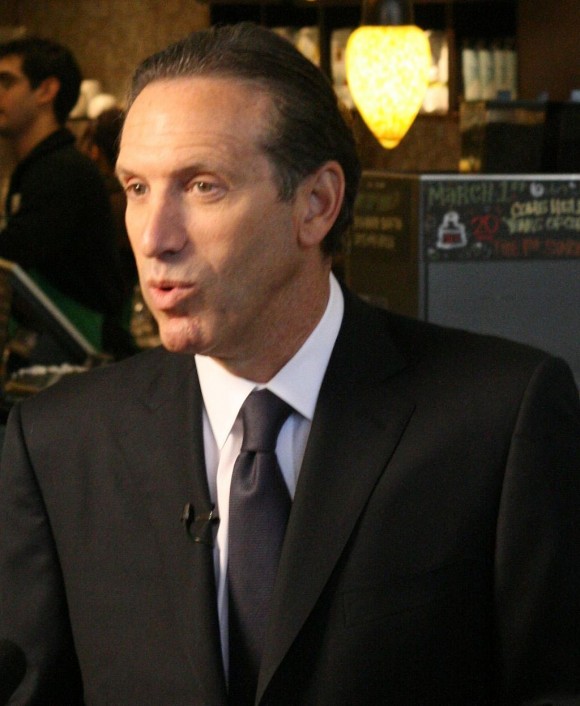Originally published by ANewDomain.net:
He’s considered a hero, and rightly so. Still, when French General Charles de Gaulle gave his most famous speech, the Appeal of 18 June 1940, not everyone was moved. “Nothing is lost for France!” the future leader of the Free French intoned into the BBC microphone to the people of France, who had just lost their country to the Nazi invasion. “The flame of the French resistance must not be extinguished and will not be extinguished!”
“Easy for him to say!” my grandfather raged. “He’s sitting over there in London, sipping tea! Here we’ve got the krauts up our ass!”
He changed his mind later. But still: terrible first communiqué.
Communications 101: If you hope others to follow you as a leader, remember who and where and what you are.
If you don’t, others will.
Starbucks CEO Howard Schultz forgot self-awareness with this week’s clumsy rollout of the coffee conglomerate’s “Race Together” advertising campaign featuring social media hashtags and handwritten cups — and stepped in something that looked and felt like a pile of day-old coffee grinds but smelled worse on Twitter.
 What could go wrong? Schultz wanted to spark a discussion about race in America. The slogan, though cloddish, was something few would argue with: Unity is good. But then: everyone hated it. “Honest to God, if you start to engage me in a race conversation before I’ve had my morning coffee, it will not end well,” tweeted the usually placid PBS NewsHour host Gwen Ifill.
What could go wrong? Schultz wanted to spark a discussion about race in America. The slogan, though cloddish, was something few would argue with: Unity is good. But then: everyone hated it. “Honest to God, if you start to engage me in a race conversation before I’ve had my morning coffee, it will not end well,” tweeted the usually placid PBS NewsHour host Gwen Ifill.
“The brand has been called tone-deaf and obnoxious,” reported The New York Times. “Many have pointed out that the company’s leadership is predominantly white, while many of its baristas are minorities.”
Oh, that.
Which is also a class thing: Schulz “earned” $28.9 million in 2012 alone. The average barrista gets $10 an hour.
What went wrong? Starbucks in general, and Schultz in particular, didn’t have the social standing — the political legitimacy — to declare a national conversation on race.
Starbucks is too white. Too unequal. Without a history of engaging customers on political issues, it jumped straight into one of the most fraught, complex and emotional: America’s original sin. “The last person I wanna discuss race with is a snotty condescending 18 yr old barista that corrects me when I say ‘large’ instead of ‘venti,’” one Twitterer tweeted.
And there’s that “Together” thing. Zillionaire Schultz and thousandaire me? We’re not even a little “together” — even though we both cash in on white male privilege. And he’s a lot less “together” with the African-American community — members of which he isn’t hiring enough of, and not paying enough to when he does.
Who the hell was Howard Schultz to lecture us about race?
Nobody.
Similarly, Facebook COO Sheryl Sandberg has turned herself into a national laughingstock by forgetting who she is and who’s she talking to.
It began with “Lean In,” her book/PR campaign/wannabe movement to encourage working women to break through the glass ceiling by being more assertive in demanding raises, promotions and responsibility. Now the zillionaire feminist is promoting “Choreplay,” in which sex-starved husbands are encouraged to buy sexual favors from their tired working wives by performing household duties like cleaning the dishes and doing the laundry.
Let’s set aside the facts that the “girls make passes at guys who wash and dry dishes and glasses” meme (a) is way old and (b) has been decisively debunked. From a 2013 study in the American Sociological Review: “Couples in which men participate more in housework typically done by women report having sex less frequently. Similarly, couples in which men participate more in traditionally masculine tasks—such as yard work, paying bills, and auto maintenance—report higher sexual frequency.”
Nothing destroys credibility like spouting outdated nonsense.
The point is: who the hell is Sheryl Sandberg to tell us anything?
The Washington Post’s book critic sussed out Sandberg’s no-moral-standing problem in her book: “By the time she describes the pangs of guilt as a mother working outside the home — some of her most poignant passages — it is impossible to forget that she, like many of the female friends she quotes, is a wealthy, white, married woman with a ‘vast support system.’ Surely she could have included a story or two about successful women who are more likely to have been born to nannies than to hire them. Or at least more who didn’t graduate from the Ivy League.”
If you’re tonedeaf, at least be nice. (It might give you standing.) Which Sandberg was not: immediately after collecting a cool $90 million in stock sales, her new foundation posted ads looking for interns.
In other words, slaves.
Like Starbucks’ Howard Schultz, Sandberg doesn’t see that as a billionaire who owes her spectacular wealth and privilege, including household staff, to her friendship with an even wealthier man who leads a company whose tiny workforce isn’t unionized, works “at will,” and is increasingly outsourced overseas at insanely low wages, she shouldn’t telling working-class (or middle-class) women what to do.
She ought to shut up and listen.
Then, of course, there’s Hillary Clinton’s latest scandal, Emailgate.
She’d already blown the moral standing thing as a “feminist icon” who’d be unknown to the world had she not married well, and as a millionaire — at least 25 times over — who claims to have recently gone from “broke” to “not well off.”
Then she defended her decisions not to use government email as secretary of state, and delete thousands of contemporaneous private emails as attempts to protect her privacy — something every American could identify with.
“No one wants their personal emails made public, and I think most people understand that and respect that privacy,” she said.
Indeed we do.
Unfortunately, Clinton has as much moral standing on privacy rights as Dick Cheney has as a peacemaker. She voted for the Patriot Act, which unleashed the NSA monster that reads everybody’s emails, everywhere, all the time, and even called Edward Snowden a traitor for letting us know what the NSA is up to. She’s a hypocrite. Worse than that, she’s made herself look ridiculous.
Before you open your mouth to lecture anyone, remember the cautionary tales of tonedeaf elitists like Schultz, Sandberg and Clinton. If you don’t have standing to talk, you’ve got nothing to say.


 “What’s Really at Stake in Ellen Pao’s Kleiner Perkins Lawsuit,”
“What’s Really at Stake in Ellen Pao’s Kleiner Perkins Lawsuit,”  Whereas Bush and Republican party operatives created a private domain,
Whereas Bush and Republican party operatives created a private domain, 
 At worst, drone operators report being mind
At worst, drone operators report being mind 
 “Was I worried? Yes, a tinge,” Skenazy admitted. “But it didn’t strike me as that daring, either. Isn’t New York as safe now as it was in 1963? It’s not like we’re living in downtown Baghdad.”
“Was I worried? Yes, a tinge,” Skenazy admitted. “But it didn’t strike me as that daring, either. Isn’t New York as safe now as it was in 1963? It’s not like we’re living in downtown Baghdad.”